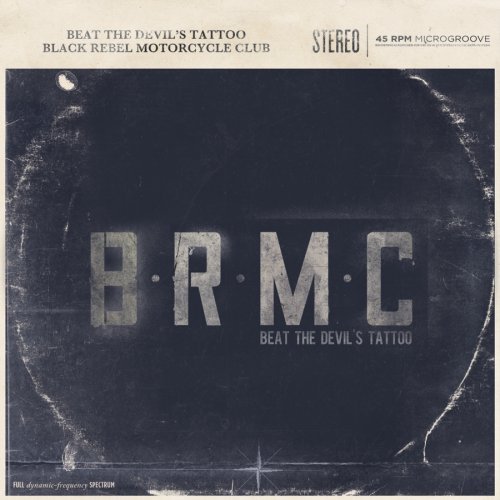
Black Rebel Motorcycle Club
Beat The Devil's Tattoo
Release Date: Mar 9, 2010
Genre(s): Rock, Alternative
Record label: Abstract Dragon/Vagrant
Music Critic Score
How the Music Critic Score works
Buy Beat The Devil's Tattoo from Amazon
Album Review: Beat The Devil's Tattoo by Black Rebel Motorcycle Club
Very Good, Based on 9 Critics
Based on rating 85%%
With Howl five years past, BRMC is looking to strike a balance between the band’s finest hour and some forward-thinking musical evolution. Beat the Devil’s Tattoo perpetuates the outfit’s signature Gothic, balls-to-the-wall-guitar drone, but where 2007’s Baby 81 ignored its nearly flawless predecessor, the newest offering embraces it, marrying grainy guitar fuzz with Howl-esque Americana romp and stomp. It’s no leap forward, but surely no step backward either .
Based on rating 8/10
Black Rebel Motorcycle Club's 2010 album, Beat the Devil's Tattoo, finds the band splitting the difference between the rootsy Americana of 2005's Howl and the return to fuzzed-out noise rock that was 2007's Baby 81. Having once again parted ways with original drummer Nick Jago, bassist Robert Levon Been and guitarist Peter Hayes seem to have found a renewed creative spark with replacement drummer Leah Shapiro. Shapiro comes to the fold with strong noise rock credentials, having been a member of the punk-psych N.Y.C.-based Dead Combo and touring with the Raveonettes.
Based on rating 8/10
At the start of the previous decade, Black Rebel Motorcycle Club were being lauded as the rock'n'roll outfit to carry the torch into the post-millennial abyss and beyond. At the very least, their mysterious demeanour and dark musings made them a darn sight more interesting than the other musicians of the day, be that the big-shorted, loud of mouth brigade spearheaded by Limp Bizkit, or the Britpop hangover led by dullards such as Travis. As happens all too often though, the love affair ended almost as briefly as it had begun, largely orchestrated by less than captivating live shows and in the case of their third album Howl, a seemingly insatiable desire to commit career suicide.
Based on rating 4.0/5
Beat the Devil’s Tattoo isn’t some heady exercise in rock transcendence or romanticism. Rather, it’s a greasy, dirty, stomping beast, bleeding mud and exhaling dust, wheezing on ashy cigarettes as the boys of Black Rebel Motorcycle Club seek to personify, celebrate, and finally eulogize the ravaged sound of bar-bred, blue-collar rock. At its finest, the album serves as the ideal soundtrack for a fleet of lonely, grizzled bikers lost on a desert highway: slow-rolling and hardened, simultaneously seething, brooding, and wistful, and armed with the pride of vagrancy.
Based on rating 7.2/10
Bad attitude makes for good rock Over the past nine years and five albums, Black Rebel Motorcycle Club has worked hard to craft a sound that’s both familiar and undeniably its own: slow-pounding drums, jagged and droning guitars, Peter Hayes’ dead-eyed vocals and the same too-cool attitude of that quiet dude at the bar who’s flipping through the jukebox, playing The Velvet Underground’s “Heroin” as if it’ll get people dancing. While 2007’s hollow Baby 81 replaced good songs with excess attitude, Beat the Devil’s Tattoo finds a balance in grimy blues licks (“War Machine”), catchy hooks (“Bad Blood”) and some huge, slabs of rock (“Aya”). The ballads peek out from the shadows—bruised, but too tough to show it.
Based on rating 3/5
In case your faith in Black Rebel Motorcycle Club was traumatically shaken by their courageous but thoroughly unlistenable 2008 experimental instro album The Effects Of 333, you'll be relieved that BRMC are once again revving their rock 'n' roll engines. [rssbreak] In much the same way that they returned to drone rock after their 2005 Deep South Americana phase, singer/guitarist Peter Hayes and Robert Levon Been return to their early 2000s form by riding Been's chugging bass lines and dialed-down tempos into navel-gazing rock oblivion, like on Shadow's Keeper and the 10-minute coda Half-State. They may have quenched their thirst for charging rock, but it's their mellower songs that stand out.
Based on rating 6/10
Black Rebel Motorcycle Club makes rock music. It’s simple, it’s fuzzy, it’s not always that good but it’s always unmistakably them. They always sound confident even if they don’t know exactly who they are, and they always take themselves far too seriously for me to take them seriously at all. Beat the Devils Tattoo is the follow-up to 2009’s completely and utterly dismal instrumental affair The Effects of 333.
Based on rating 4.0/10
As rock traditionalists go, Black Rebel Motorcycle Club were a little bit ahead of their time. Sure, the California leather jacketers came up a few years after the Dandy Warhols and Brian Jonestown Massacre, and more or less alongside Detroit garage-rockers like the White Stripes. But 2001 debut B.R.M.C. loudly heralded the rock-is-back swagger that would soon hit glossy magazines in the form of the Strokes, the Vines, and the Hives.
Opinion: Excellent
Emerges from the swampland armed with an acoustic, and desire in its belly. Reef Younis 2010 Somewhere between the blues and gospel spectres of the Deep South, and the political intensity that, for the most part, has characterised Black Rebel Motorcycle Club to date, Beat the Devil’s Tattoo emerges from the swampland armed with an acoustic, and desire in its belly. After the middling, mixed reception of previous releases, Baby 81 and The Effects of 333, there’s a palpable, renewed force here, ignited by the firebrand passion that made their early output soexcitingly vital.
'Beat The Devil's Tattoo'
is available now

